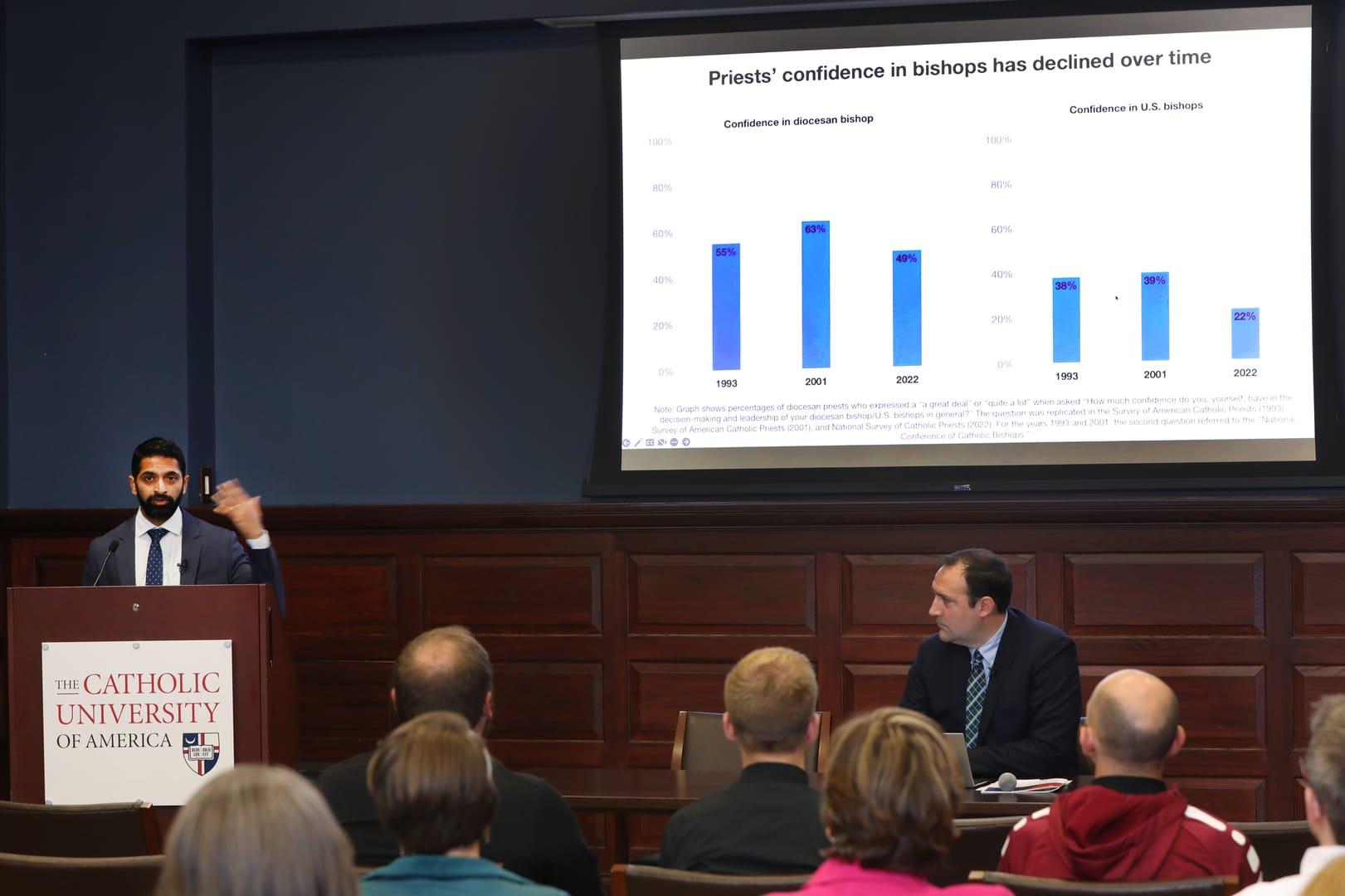NEW YORK – A new study has found that while the vast majority of U.S. priests support the Dallas Charter and the institutional response to the clergy sex abuse crisis, they often fear being falsely accused and aren’t confident that their bishop would support them if that were the case.
In fact, the study, conducted by The Catholic University of America’s Catholic Project, found that even though U.S. priests’ morale is high, their overall trust in the bishops isn’t great, and the younger priests especially experience some type of burnout.
Stephen White, executive director of the Catholic Project, said the goal of the survey, titled “Well-being, Trust, and Policy in a Time of Crisis: Highlights from the National Study of Catholic Priests,” is change.
“The hope is that if we were to do the same survey five years from now, things would look different,” White said in a statement. “Priests are happy in their vocations, but we also want them to feel less anxious and more supported. I know the bishops want that too. Hopefully this data can help in that regard.”
The impetus for the survey was the twentieth anniversary of the Dallas Charter, and studying the national child protection policies from a perspective of a question that has seldom been explored. That is, “what is the state of the Catholic priesthood in the United States today?”
To find that answer researchers surveyed 10,000 U.S. Catholic priests across 191 dioceses and eparchies, receiving 3,516 responses, or about a 36 percent valid response rate. They also conducted in-depth interviews with more than 100 priests who participated in the survey, and sent another survey out to all of the U.S. bishops, of which 131 replied.
The survey used the Harvard University Flourishing Index to measure the bishops’ and priests’ well-being. The results show that in general 77 percent of priests and 81 percent of bishops can be categorized as “flourishing,” based on the cutoff scoring recommended by the Harvard team.
There were, however, areas of concern: 45 percent of priests reported at least one symptom of ministry burnout. 9 percent reported severe burnout. And the survey found that younger priests are more likely to be the ones who experience some form of burnout.
“Gaining a better understanding of causes of burnout among younger priests is crucial for improving priestly formation and clergy retention,” the survey states.
Trust was another issue. 49 percent of surveyed priests expressed confidence in their bishop, but only 24 expressed confidence in the leadership and decision-making of the U.S. bishops as a whole. The priests ranked bishops lowest among their various sources of social support, with 36 percent of them saying their bishop would be a good resource for them to go to with a personal struggle.
An unnamed priest quoted in the survey said that his bishop is basically an “administrator who just wants to cover his own rear end and not really care about the priests.”
Based on the survey’s findings, it cites that at least some of the priests’ mistrust in the bishops comes from their experiences of the application of the policies created in the wake of the abuse crisis.
While 90 percent of priests see their dioceses as having a strong culture of child safety and protection, 40 percent of priests see the zero-tolerance policy as too harsh. Further, 82 percent of surveyed priests responded that they regularly fear being falsely accused of sexual abuse.
Only 36 percent of diocesan priests said they believed they would be provided with sufficient resources by their local diocese to defend themselves when an allegation is made, and 51 percent said they believe that their bishop would support them if that were to happen.
“Among the priests, there is this general sense, first, that the bishops don’t have our backs … There is this sense … that the bishops are against a priest who has been accused, rather than doing what the bishop must do but still supporting the priest,” an unnamed priest said in the survey.
Another unnamed priest added that they “have no idea” about what the review board’s process “and so there’s a lot of mistrust about that … we don’t know what standard we’re going to be judged by.”
Priests’ recommendations on steps bishops can take to improve trust with their priests starts with strengthening personal relationships “as brother and father rather than employer.”
Next the priests desire the bishops to practice more transparency and accountability. Transparency, regarding planning and decision making around matters such as finances and assignments, and about the review process for allegations of abuse and ensuring due process.
On accountability, priests are looking for a consistent standard, according to the survey.
“Bishops should be held accountable just as priests are … Also, they should be faithful to Catholic teaching which, sadly, many often are not,” an unnamed priest said in the survey.
Follow John Lavenburg on Twitter: @johnlavenburg













